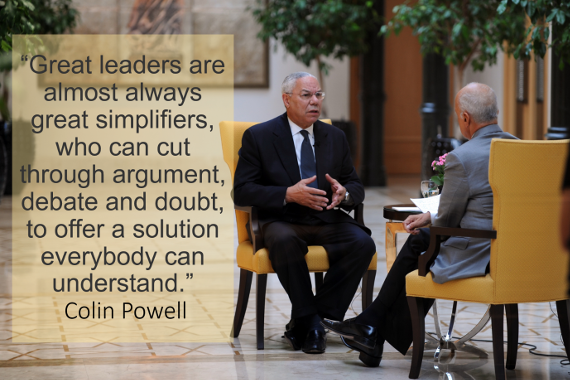|
|
|
|
|
|
|
|
|
Dear reader,
Welcome to the April 2019 edition of The Director's Dilemma.
These dilemmas are based on real events that have occurred during my twenty years' experience serving on and consulting to boards. This month our case study protagonist faces a dilemma that occurs more frequently than it should. It will require a politically astute response that is sensitive to the needs of the director concerned, the shareholder, and the needs of the organisation.
Boards don't only succeed when the organisation is profitable or growing; they succeed when they avoid becoming front page news, banned or fined. I help boards to succeed in both these ways, by strategically identifying latent problems, and guiding clients to address threats before they eventuate.
To read this email in a web browser, go to www.mclellan.com.au/newsletter.html and click on 'read the latest issue'. I hope you enjoy thinking about the governance and strategic implications of the latest dilemma:
 Justin chairs a government-owned board. He was appointed for a five-year term just before a change of government and, hence, Minister. The new Minister respects the professionalism of the board, the business has met its targets, and relations have been cordial. Justin chairs a government-owned board. He was appointed for a five-year term just before a change of government and, hence, Minister. The new Minister respects the professionalism of the board, the business has met its targets, and relations have been cordial.
The chair of the board audit and risk committee reached the end of his tenure in December and the Minister appointed a replacement without consulting Justin. The new director is a qualified accountant. However, he has been appointed to three other government boards in the past six months and already had a portfolio of six directorships including three large listed companies. Justin was initially pleased to have such an experienced director join the board and looked to him as a potential successor.
In just four months the new director has upset his board colleagues and staff. He has asked questions when the answers were clear in the papers, failed to attend the induction training, and is often distracted during board meetings. Justin had a quiet conversation with the director asking him to be more attentive; the director was polite but made it clear that he had higher priorities and "the Minister is aware of the other demands on my time".
At the last meeting the director seated beside the new appointee was able to see his laptop and, after the meeting, she sent an email to the board saying that he had been responding to correspondence about one of his other boards.
Justin feels he must make another attempt to restore good practice or risk losing the cohesion of his board.
How should he start?
|
|
|
|
Mpho's Answer
 Justin should have a meeting with the new board member and have a stronger conversation about his behaviour. He should 'call out' this behaviour during the board meeting when it happens again - because his perceived silence will compromise his credibility with the rest of the board. Justin should have a meeting with the new board member and have a stronger conversation about his behaviour. He should 'call out' this behaviour during the board meeting when it happens again - because his perceived silence will compromise his credibility with the rest of the board.
The new Minister respects the professionalism of the board and the relationship is cordial - against this background, Justin should use this 'currency' well to request a meeting with the Minister to discuss the challenge:
1. Discuss the challenges faced with the new board member and Justin's actions to-date and discuss joint remedies. The Minister should reinforce the role and authority of the Chairman to the new board member
2. Discuss and agree on the Chairman's mandate on such issues in the future
3. Discuss and agree on 'ways of working' between him and the new Minister on several issues, including (but not limited to) future appointments, regular effectiveness measurement of the board, exiting of ineffective board members etc. and some of these decisions may flow into the Board Charter for proper governance. Despite the appointment being the Minister's mandate, prior discussions with Justin, referencing of candidates, etc are important for both the Minister and Justin and the board that the best candidates are appointed
4. Propose / discuss / agree on the maximum boards a NED can serve to avoid future appointments of board members with limited capacity
Mpho Nkeli is a non-executive director of Impala Platinum and Life Healthcare, she is also a Director of AltoPartners South Africa. She is based in Johannesburg, South Africa.
|
|
|
|
Julie's Answer

In a recent survey more than 56% of directors said their boards had one or more ineffective directors but had not taken steps to remedy the issue and improve performance or remove them from the board. Justin has made one attempt and must make others until he succeeds.
He should start by talking with the director who sent the email. Board performance is Justin's territory and she should have brought the matter to his attention alone. She now needs to trust Justin and allow him to address the issue without further interference.
Although government boards lack the prestige or remuneration of a listed board, they are highly prized appointments that allow directors to work in areas they are passionate about. Justin's new director accepted the role for a reason. Justin should find out what that reason was. He must rekindle whatever passion brought this director to his board. Ideally, he will talk with the new director; if he can't get a second audience he should talk with the Minister and/or appointing panel.
A formal board performance review, with individual director assessments and results published in the annual report, can also help. Carefully crafted questions make clear who is adding value, and who is not. Knowing that the review is coming will be an incentive to prioritise this board.
Finally, Justin needs to look in the mirror. Performance has been good. The directors are engaged. Is it possible meetings are too frequent, long, or operational? A strategic agenda energises and enthuses directors to give their best. Improving the board's operations may catalyse better performance.
Julie Garland McLellan is a non-executive director and board consultant based in Sydney, Australia.
|
|
|
|
Steve's Answer
 Under Queensland law, a government-owned corporations (GOC) is a public company limited by shares and as such, the federal Corporations Act 2001 applies, except to the extent excluded by the GOC Act 1993. The Treasurer and the Portfolio Minister are the only shareholders. Under Queensland law, a government-owned corporations (GOC) is a public company limited by shares and as such, the federal Corporations Act 2001 applies, except to the extent excluded by the GOC Act 1993. The Treasurer and the Portfolio Minister are the only shareholders.
The new Minister apparently respects the professionalism of the Board and has no issue with the performance of the GOC.
There is research around on what constitutes a high performing Board. The characteristics of the Board Members include active engagement evinced by a collaborative and co-operational attitude. Best practice boards also have a process for reviewing the performance of the Board, its Committees and each Director.
The Board could have an independent review of its performance. It's assumed that the review will back up the anecdotal evidence of the other Board members. Justin could discuss some options with the Deputy Chair e.g.,
1. Reduce the number of Boards the recalcitrant Director is on
2. Remove the Director from the Board
Justin and the Deputy could meet with the shareholding Ministers to provide the evidence on how the behaviour of the Director is impacting the performance of the Board and the ability of the business to meet its targets, which may lead to questions in the Parliament or comments from the Auditor-General, if that performance deteriorates: both of which Ministers would prefer to avoid.
Should there be no remediation, Justin may need to decide if he remains on the Board.
Dr Steven Austen is a Board and Finance Committee Member of Independent Schools Queensland and acting Company Secretary of Whitsunday Anglican School. He is based in Mackay, Queensland, Australia.
|
|
|
|
Book Review – All Above Board; great governance for the government sector
Government owned organisations are very different from private sector organisations. They may be more regulated, subject to shareholder scrutiny, and expected to achieve societal or environmental outcomes in addition to financial targets.
Many people characterise government-owned businesses as inherently less risky than private-sector enterprises. This is a misconception. Frequently government businesses work in fields in which commercial business cannot operate effectively. Monopoly status leads to conflicts between the need to generate profits and the need to supply essential services.
An elected shareholder, responsible for supplying the community with adequate levels of service, as well as for effective stewardship of assets, is an imperfect solution to this problem, but it is the best solution available for many activities. In addition to the usual business risks there is a greater risk to society or the economy that arises from the often-essential nature of the goods or services provided. Balancing the risks and rewards is a constant challenge. This book will help readers to meet, and beat, that challenge.
Available at the AICD Bookstore with a discount for members.
Julie's News - In March
This month is always special!
I started the month with the Australian Institute of Company Directors Corporate Governance Summit which is always a great occasion for catching up with acquaintances, meeting new directors, and hearing from experts on a range of matters that are important for boards.

Then I visited beautiful Mulwala to deliver a two-day advanced governance course for local directors. It is always a pleasure to take director education out to regional and rural Australia. There is such a need for proactive, strategic governance that can build strong local businesses, community organisations, and associations; without them our smaller communities become unsustainable.
A highlight for me was the friendly Mulwala Kookaburra who visited the course in search of food and was quite tame (for a wild animal).
Client work in Strathfield, Canberra, and Sydney allowed just enough time to attend a 'Board of the Future' event focused on what directors need to know about trade and an executive roundtable on trust in the wake of the Hayne Royal Commission.
Then I was off to Kingscliff for a wonderful Professional Speakers' Convention. It is such an honour to stand at the front of the room and be paid for sharing my board knowledge; it makes it essential that I invest in improving and enhancing my speaking and educational skills as well as my governance skills.
A few more events in Sydney and a lot of work reviewing board performance and developing a course on conflict resolution for boards kept me happily busy all month.
I am always keen to work more and will be delighted to hear from you if you would like to arrange a board strategy workshop, education session, or board performance review. Just call me on +61 411 262 470 or reply to this email for a discussion of how I might help your board.
Inspirational quote for April - This month my favourite quote is:

One of my aspirational goals when teaching is to make everything as simple as it needs to be.
A note on names - A few readers have asked me where I find the names for the protagonists in each case study; I 'borrow' them from people I meet or things that I read. Justin is an anglicized form of the Latin given name Justinus, a derivative of Justus, meaning "just", "fair", or "righteous". Our protagonist Justin will need to show fairness and empathy as he brings his disappointing director up to acceptable performance. He will also need to ensure that he fairly considers whether he has had a part to play in the performance issues.
This newsletter - If you have any ideas for improving the newsletter please let me know. If you are reading a forwarded copy please visit my website and sign up for your own subscription.
Suggestions for dilemmas - Thank you to all the readers who have suggested dilemmas. They are greatly appreciated. I will answer them all eventually. I could not write this newsletter without your help and without the generous help of all the experts who respond each month to the case studies.
Be a contributor - If you would like to attempt a response to the dilemmas for publication you will be most welcome. Simply reply to this email and let me know.
Let's connect - I use LinkedIn to share information about boards and directorship with my friends and acquaintances. If you use LinkedIn and we are not yet connected I will welcome a connection from you. You can find me at linkedin.com/in/juliegarlandmclellan.
Let me help you - I would be delighted to speak for or train your board, staff, audience and/or group. If I can help please contact me at julie@mclellan.com.au.
Farewell until the next issue (due 1 May 2019). I look forward to greeting you again then. In the interim I hope you will enjoy health, happiness and hard work.
Enjoy governing your corporations; we are privileged to do what we do!
Best regards,
Julie
Photo Credits: Personal images in this newsletter are provided courtesy of the contributors, course attendees and conference participants.
Main Photo by courtesy of Shutterstock.com.
Disclaimer:
The opinions expressed above are general in nature and are designed to help you to develop your judgement as a director. They are not a definitive legal ruling and do not constitute legal advice. Names and some circumstances in the case study have been changed to ensure anonymity. Contributors to this newsletter comment in the context of their own jurisdiction; readers should check their local laws and regulations as they may be very different.
Privacy:
I am privileged to have your contact details and keep them as safely as possible. I will alert you if they are ever accessed by any unauthorised person (the technical staff at ayuda help with publishing and issuing the Director's Dilemma nad have access so they can send the newsletters to you). I do not sell your details to anyone; they are kept only for the intended purpose - sending you this newsletter and helping to build the judgement of company directors by providing a safe way to consider potential responses to real life events.
|
|
|
|
|
|
|
|
|
|
|
|
|
 Justin chairs a government-owned board. He was appointed for a five-year term just before a change of government and, hence, Minister. The new Minister respects the professionalism of the board, the business has met its targets, and relations have been cordial.
Justin chairs a government-owned board. He was appointed for a five-year term just before a change of government and, hence, Minister. The new Minister respects the professionalism of the board, the business has met its targets, and relations have been cordial.
 Justin should have a meeting with the new board member and have a stronger conversation about his behaviour. He should 'call out' this behaviour during the board meeting when it happens again - because his perceived silence will compromise his credibility with the rest of the board.
Justin should have a meeting with the new board member and have a stronger conversation about his behaviour. He should 'call out' this behaviour during the board meeting when it happens again - because his perceived silence will compromise his credibility with the rest of the board.
 Under Queensland law, a government-owned corporations (GOC) is a public company limited by shares and as such, the federal Corporations Act 2001 applies, except to the extent excluded by the GOC Act 1993. The Treasurer and the Portfolio Minister are the only shareholders.
Under Queensland law, a government-owned corporations (GOC) is a public company limited by shares and as such, the federal Corporations Act 2001 applies, except to the extent excluded by the GOC Act 1993. The Treasurer and the Portfolio Minister are the only shareholders.

